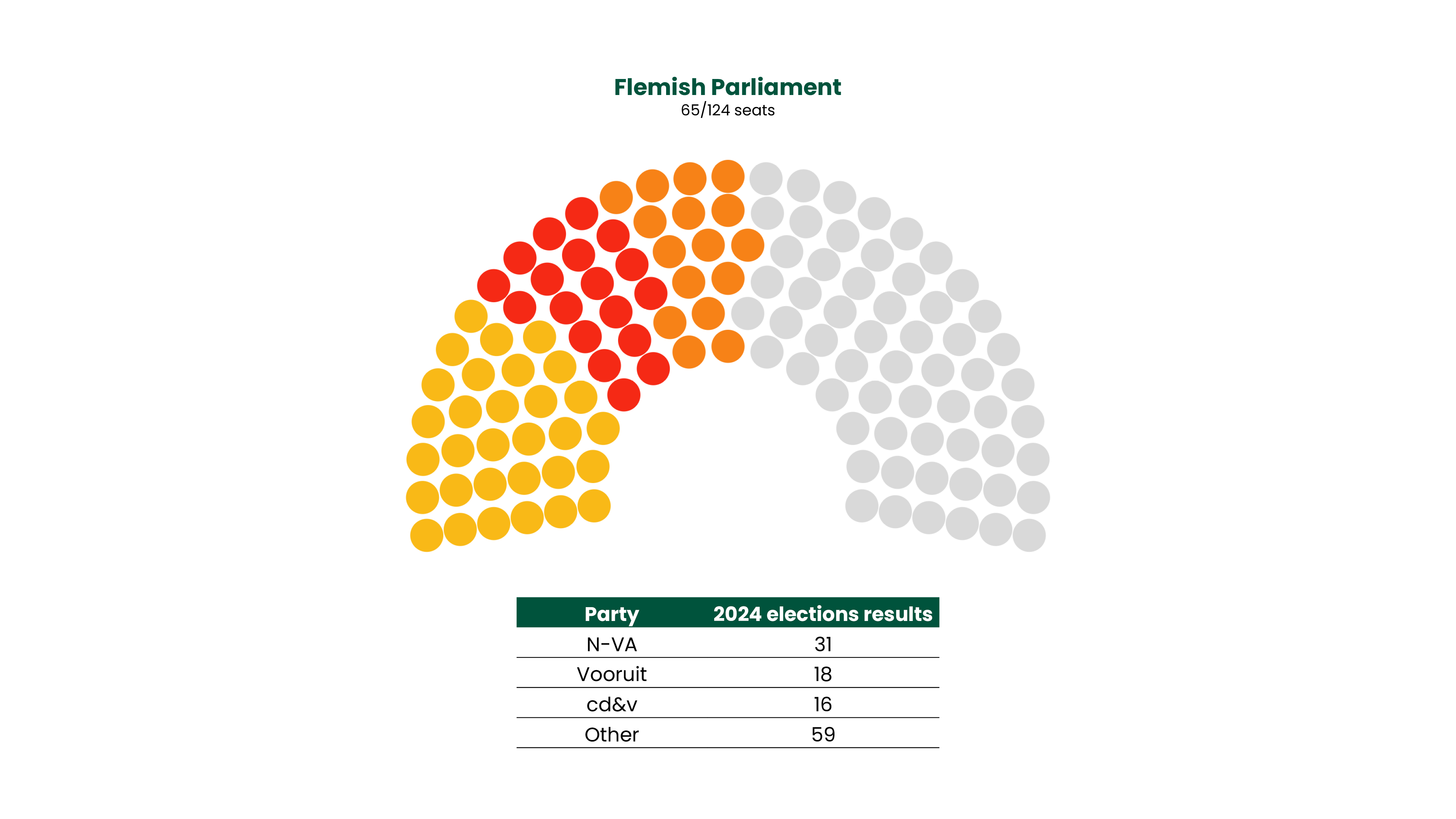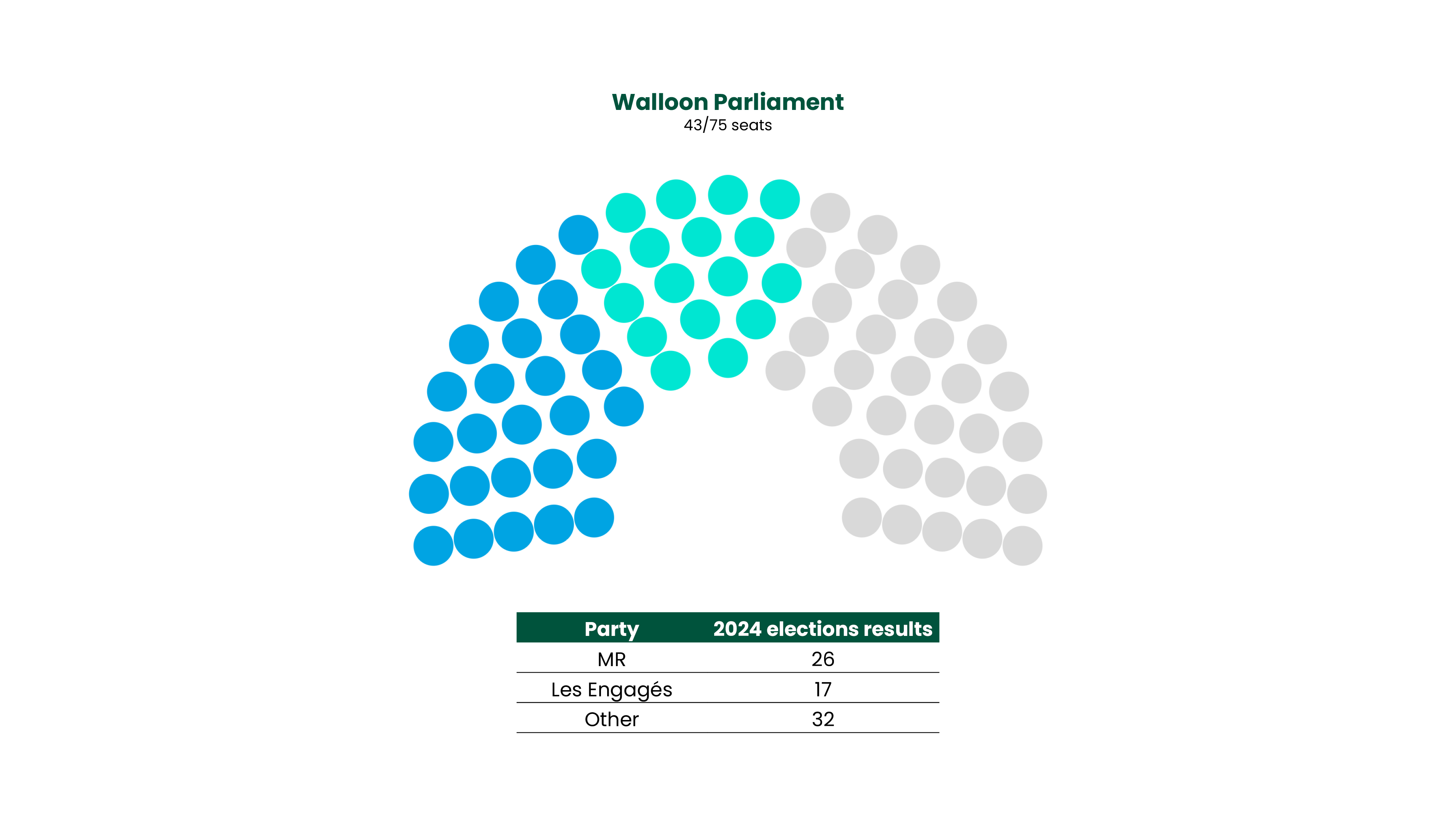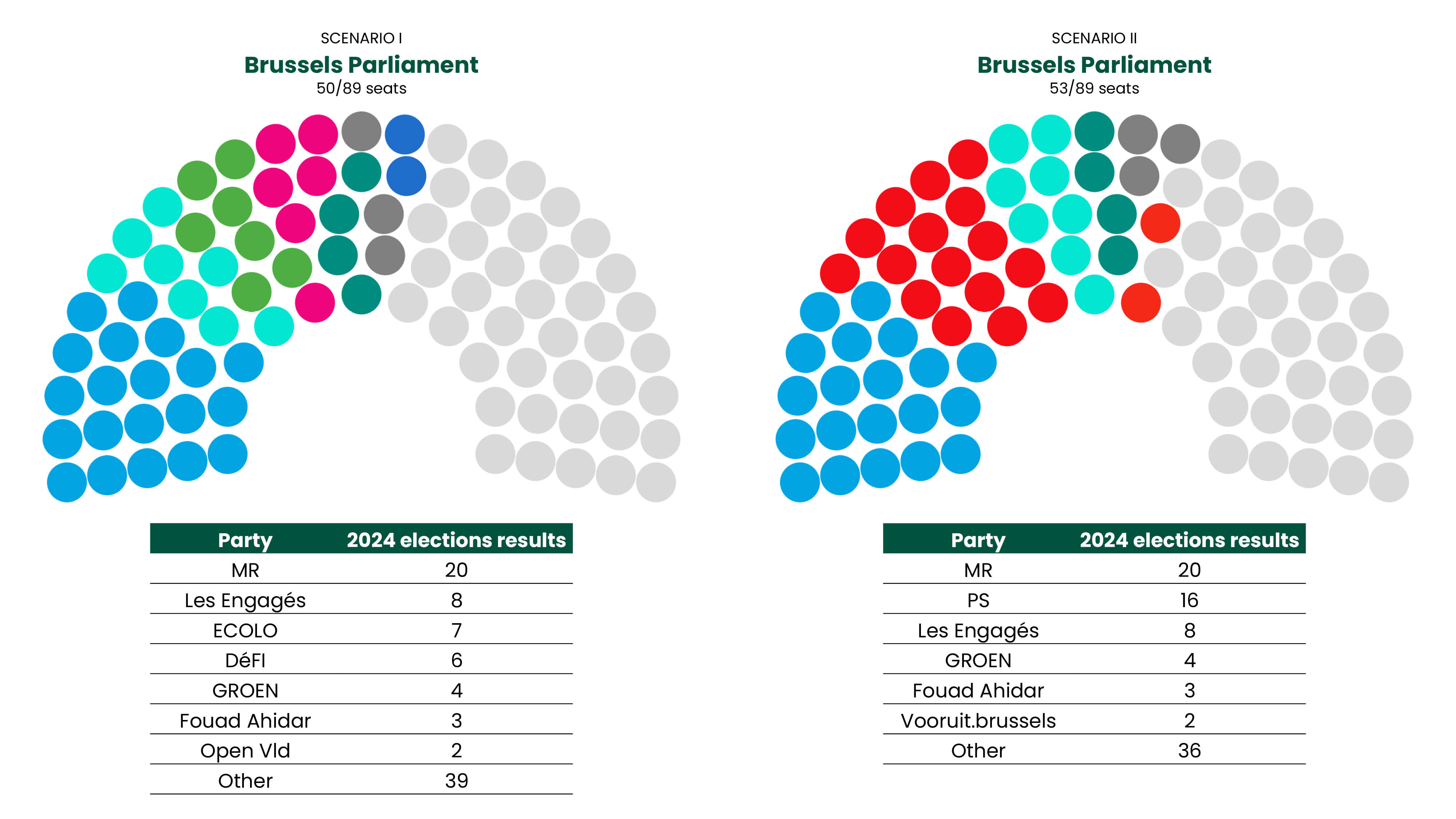On 9 June, Belgian citizens cast their ballots to elect their regional, federal and European representatives. In general, voters in favoured centre-right and right-leaning parties, shifting the political dynamics further to the right in all regions – except from Brussels. While the extremist parties gained traction, the huge wave foreseen in polls ahead of the 2024 Belgian elections did not materialise. At federal level, the N-VA (nationalists, ECR) secures its first position ahead of Vlaams Belang (far-right and separatists, ID) despite the latter gaining two additional seats and the PTB (French-speaking communists, The Left) only benefits from a minor improvement as well.
The outgoing “Vivaldi” coalition was heavily penalised, losing 11 seats. It is a setback for the PS (French-speaking socialists, S&D), but especially for Ecolo and Groen (both French and Dutch-speaking, Greens/EFA) and Prime Minister De Croo’s Open VLD (Dutch-speaking liberals, Renew) which received the most severe blows.
The biggest winners were, on the one side, the N-VA (Dutch-speaking nationalists, ECR), even though they conceded one seat. The task of forming a federal team will, therefore, more than likely fall on their President, Bart De Wever. On the other hand, both the MR and Les Engagés (French-speaking liberals and christian democrats) consider these elections as a triumph after their landslide victories. They respectively gained 6 and 9 seats, rendering their participation in the next federal and Walloon governments almost inevitable. Their Presidents announced that they will form an alliance for negotiations formation the Walloon government, Wallonia-Brussels Federation (FWB) government and federal government.
Belgian election 2024 results
At federal level, Vivaldi II is unlikely: the outgoing centre-left “Vivaldi” coalition composed of socialists, liberals, greens (of both Dutch- and French-speaking parties) as well as CD&V (Dutch-speaking christian democrats, EPP) gathered a very narrow majority of 76 seats. Open VLD, PS, Ecolo and Groen announced they will remain in opposition at all levels due to the disappointing results.
In Flanders, N-VA came out on top with 24 seats, followed by Vlaams Belang with 20 seats, 13 seats for Vooruit (socialists, S&D) and 11 seats for CD&V. Open VLD and Groen suffered major losses.
In Wallonia, MR unexpectedly clinched the top spot totalling 20 seats, ahead of PS with 16 seats, while Les Engagés made a strong comeback with 15 seats – after sitting on the opposition bench for the past legislature. PTB/PvDA (communists, The Left) the only unitarian party in the country, got hold of 15 seats.
Federal government scenario I: Centrist “Arizona” coalition
As it stands, the most plausible option includes an “Arizona” coalition between N-VA, CD&V, MR, Les Engagés, adding Vooruit as the last partner. This coalition would represent the addition of both so far likely regional governments, which would make political negotiations much easier. It could also significantly speed up the time needed to form governments, although it all depends on the policy concessions they will each make to form a team.
Despite being branded as a left-leaning party, the Flemish socialists of Vooruit have expressed identical ideological acquaintances with right-leaning parties especially on socio-economic issues. However, in order to join a centre-right coalition at both Flemish and federal levels, they are expected to play hardball. With Open VLD, PS, Groen and Ecolo choosing for opposition, they are the likely kingmaker holding a lot of power over negotiations.
Furthermore, this potential coalition could provide a largest majority to the coalition with 82 seats, compared to 78 seats proposed by the “Swedish” coalition 2.0 as shown below.
Federal government scenario Il: Swedish coalition 2.0
In case Open VLD decides to join a government anyway to reach a majority, there could be a revival of the 2014-2019 centre-right “Swedish” coalition composed of the N-VA, CD&V, Open VLD and MR adding Les Engagés into the mix. The coalition would get a very narrow majority of 76 seats.
During the 2024 Belgian elections campaign, liberals and christian democrats expressed interest in forming the “centre-right axis” of the next federal government and stated they have common ground with N-VA on social-economic, security, and immigration issues. However, N-VA’s appetite to open the institutional pandora box aimed at granting more autonomy to regions could be a sticking point to form a potential “Swedish” coalition 2.0.

Flemish Parliament
In Flanders, election results mirror the federal score as N-VA is in leading position with 31 seats, followed by Vlaams Belang which also gathers 31 seats. Vooruit has 18 seats, and CD&V 16. PM De Croo’s Open VLD party drowns with only 9 seats, compared to the 16 obtained in 2019 elections. The Greens end up with 9 seats too, losing 5 seats.
Speculations revolving around a potential coalition between N-VA and Vlaams Belang quickly seemed impossible as they do not have a majority together. In that context, a so-called “Rocket” coalition composed of N-VA, Vooruit and CD&V is more likely to happen. As they have enough seats to form a government backed by a narrow majority.

Walloon Parliament
In traditionally left-leaning Wallonia, PS got 19 seats, PTB 8 seats, and Ecolo 5 seats, losing a total of 13 seats for left parties compared to the 2019 elections. On the opposite side, the right and centre-right parties harboured a landslide victory totalling 26 seats for MR and 17 seats for Les Engagés in the Walloon Parliament allowing both parties to form a centre-right coalition government. Both parties have already announced that they kicked off negotiations to form the next Walloon government and Wallonia-Brussels Federation (FWB) government.

Brussels Parliament
In the Brussels-Capital Region, MR arrives in first position, strong of 20 seats, then PS follows with 16 seats – where they hold their ground compared to Wallonia, then PTB with 15 seats, Les Engagés with 8 seats. In the aftermath of the 2024 Belgian elections, in Brussels, majorities must be found within French-speaking and Dutch-speaking parties respectively. To avoid a coalition with the PS, the MR will need to team up with Les Engagés, Ecolo and DéFI if they want to reach the French-speaking majority of minimum of 37 seats. However, Ecolo prefers to be in opposition given the low score. Would MR and PS dare to govern together?
In case MR and PS are, they could also form a majority with Les Engagés. But this option is unclear as the PS has indicated it is not willing to partake in any government in light of their electoral losses, except maybe in Brussels. For Dutch-speaking parties, Groen – which also chose the opposition except in the Brussels-Capital region, Team Fouad Ahidar (second biggest party) and Vooruit could join the coalition due to their ideological resemblances. Open VLD has indicated they are not willing to govern at any political level.

European elections
These Belgian elections 2024 were organised at the same time as the Europe-wide European Parliament elections. MR (Renew), Vooruit (S&D) and PvdA (The Left) respectively gained 1 seat while Open VLD (Renew) and Ecolo (French-speaking greens) lost 1, mirroring the outcome of the federal election’s results. In total, ID has 3 seats, ECR 3, Renew 4, EPP 4, S&D 4, Greens 2, The Left 2. Important to note that the former Prime Minister and lead candidate of MR Sophie Wilmès broke a historic record and garnered more than 540,000 votes in the European ballot, outnumbering the candidates in the Dutch electoral college despite its larger population. However, she is not expected to become a MEP as she is rumoured to covet a high-level role within the next federal government.
What next?
Prime Minister De Croo is not going to return for a second term, but he will remain Prime Minister until the next government is in place. Whilst a new federal government was not expected before the end of the year due to the importance and impact of local elections in October, it seems that negotiations could go rather smoothly (except Brussels) given the better alignment of political winners compared to last elections (right wing in Flanders vs left wing in Wallonia) and the willingness to avoid a lengthy negotiation period that could paralyse the country for too long and could derail the budget entirely. However, it all depends on policy negotiations for the new coalition agreement as there are some huge hurdles to overcome, such as institutional question, taxes, healthcare sector.
The King met all the political parties’ presidents to take stock of the political situation. As winner of the federal elections, the president of N-VA Bart De Wever was appointed “informant” by the King, allowing him to kick off government formation negotiations. Bart De Wever will have to put on the table the demands and exclusives of the five parties concerned by the formation of the next federal majority on institutional, economic, social or health policy issues: N-VA, MR, CD&V, Les Engagés, and Vooruit.




